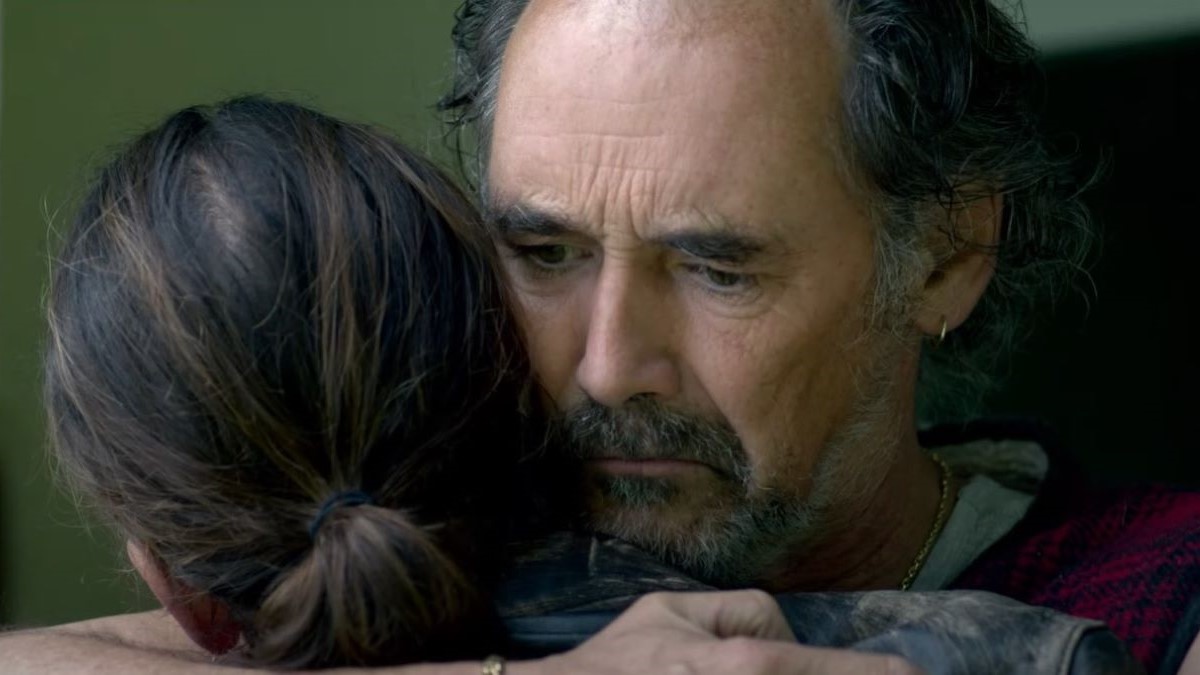The mark of any successful directorial debut is whether you can find the makings of a distinctive authorial voice underneath various layers of homage to the obvious influences. In the case of Fridtjof Ryder’s debut Inland, shot when the German-British director was just 20, it’s hard to uncover any personal voice in what is essentially an Anglicization of the typical David Lynch format––a surreal tale about the darkness that hides beneath unassuming suburbia (or here, a seemingly idyllic country lifestyle). Describing anything as “Lynchian” is fast becoming meaningless in the realm of criticism, where even the most vaguely odd works have found themselves getting breathlessly labeled such, but here everything—from the title onwards—feels deliberately designed to invoke comparisons. It’s a shame, considering how intriguing the character study is at the surface, that it never feels truly original in its own right.
Rory Alexander stars as the unnamed protagonist we’re introduced to as he’s being discharged from a mental institution. The reason for his stay is never specified, and as he returns to Gloucester to move in with father figure Dunleavy (Mark Rylance), the context for his backstory remains vague––although as he’s greeted by being jokingly called a “silly billy,” the reason for his commitment is a known factor that everybody chooses to avoid discussing openly. Though given a job at Dunleavy’s garage to get back on his feet, he remains haunted by the mysterious disappearance of his mother from years previously; we frequently hear her through Kathryn Hunter’s voiceover, speaking cryptic lines you’d be forgiven for assuming consist entirely of unused ADR from The Tragedy of Macbeth. As Inland progresses, the lead character (credited simply as “Man”) is increasingly prone to hallucinatory visions of a forest, the rug pulling back slowly to reveal a contemporary reimagining of a very familiar folktale.
Inland blends a forced ambiguity in narrative and lack of subtlety in themes. Mother-son dynamics play out in that other Lynchian trademark: the small-town drinking establishment with a sinister underbelly designed seemingly to make you wonder exactly how a place so quaint could have its own brothel. It’s here he meets and strikes up a connection with a sex worker who reminds him of his mother—cue the Garth Marenghi “I know writers who use subtext and they’re all cowards” meme as we progress into obvious Freudian territory.
Such increasing levels of dreamlike surrealism, while crucial in developing this portrait of a fractured mental state, disservice the more intriguing character study at Inland‘s center. The relationship between the Man and Dunleavy borders on genuine poignancy, if only for the self-enforced boundaries the protagonist puts in place, such as insisting on sleeping in his car even when offered somewhere to sleep––even before he experiences heightened visions of nature calling him, he doesn’t feel like he’d be welcomed within back to a conventional way of life.
But again: Ryder is more interested in making audiences read between the lines than spell out his themes. Any deeper exploration of how the Man’s trauma has led to this just becomes another part of the puzzle box he demands audiences untangle. Should the writer-director be as heavily inspired by Lynch as the film suggests, he should know his films thrived on the directness of their emotions even as they defied an audience’s conventional grasp on narrative logic. Throughout his work you can easily feel your way through it even if the destination––assuming there even is one to speak of––never becomes apparent: Ryder has mistaken a lack of clarity for the same approach to dream logic, and a potentially rich character drama remains stilted and uninvolving.
The low-budget nature of the production does help emphasize Ryder’s ability to create elusive, attention-grabbing visuals on a shoestring, but everything stands at such a remove it’s hard to want to get lost in the frame. Inland ultimately struggles to convince he can offer anything more than replicating another filmmaker’s well-worn style.
Inland screened at the BFI London Film Festival.

